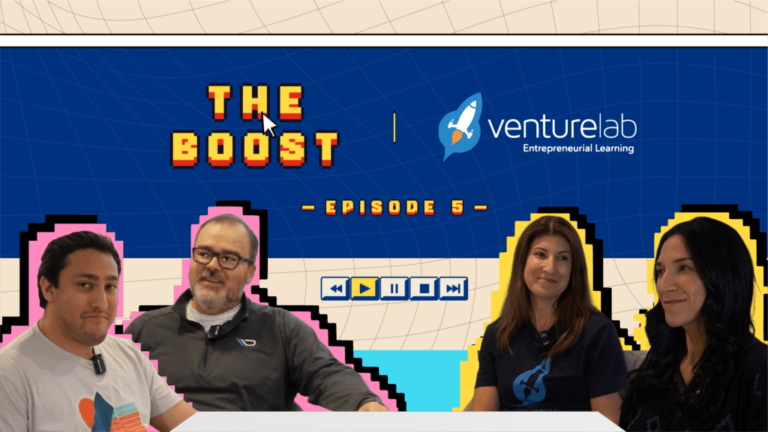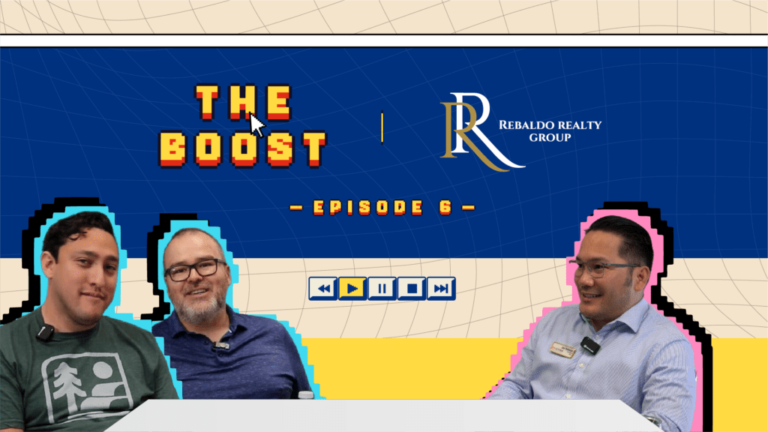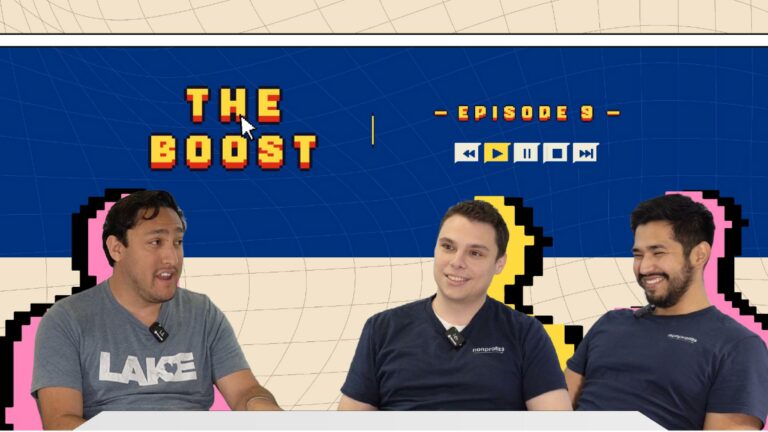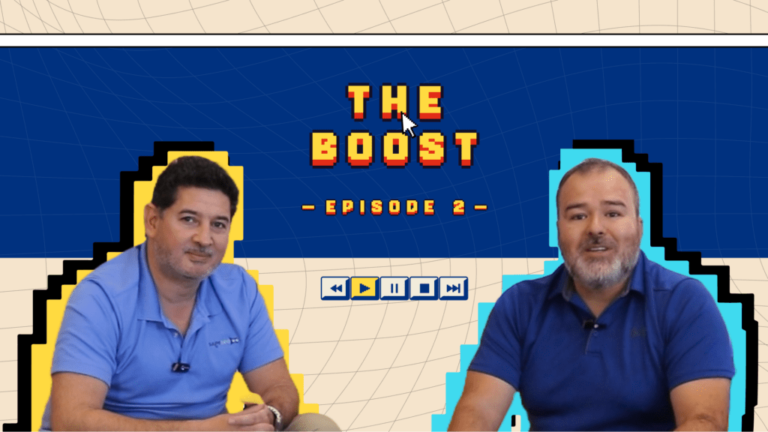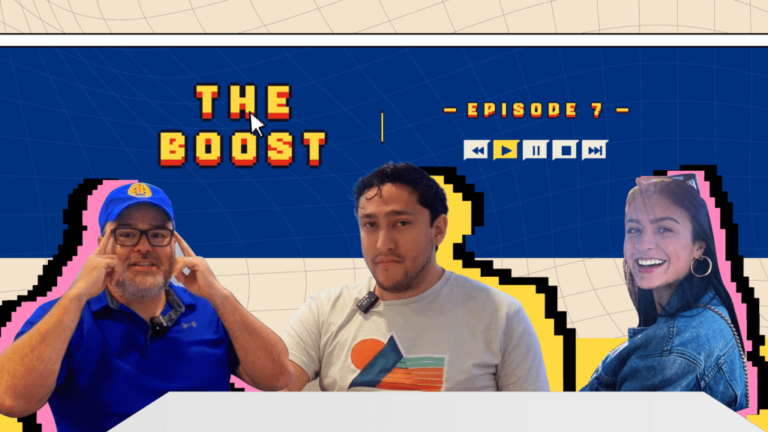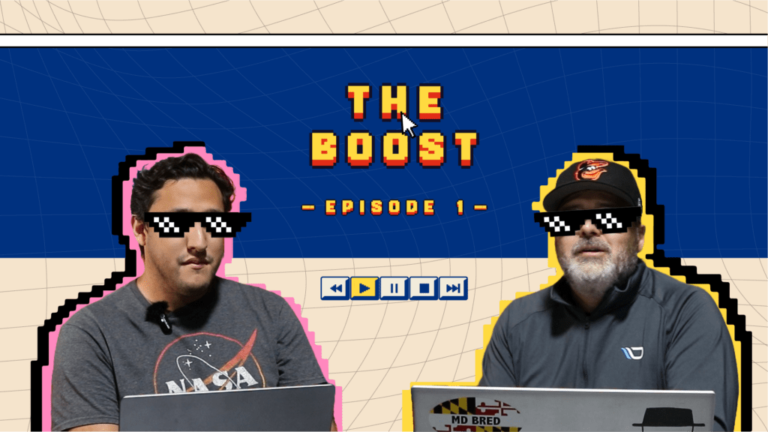Join Pablo and Leon as they discuss their experiences with Geekdom, the dynamic entrepreneurial hub of San Antonio. They share a retrospective on their journey from casual visitors to engaged members with office space, the power of mentorship, and the broader impact of Geekdom in fostering a diverse and inclusive startup ecosystem. Listen in as they unpack the post-COVID business shift to a hybrid work culture and the exciting developments shaping the future of entrepreneurship in the region.
Pablo Calvo: Linkedin
YouTube:
Podcast:
Hosts:
Pablo Calvo: Linkedin
Find Us:
YouTube: https://www.youtube.com/@TheBoostChannel
Spotify: https://open.spotify.com/show/2AHGT1Aoq9oAHZEHeORBpa?si=1cea25e611bb4ec6
Apple Podcasts: https://podcasts.apple.com/us/podcast/the-boost/id1720047128
Facebook: https://www.facebook.com/TheBoostChannel
Website: https://theboost.fm
Key Points Discussed:
Their Geekdom Story:
- Pablo and Leon’s introduction to Geekdom dates back to 2018, with an official office presence since March.
- Reflections on how they’ve engaged with Geekdom over the years, evolving from utilizing coworking spaces to becoming active mentors within the community.
Mentorship and Community Engagement:
- Discussion on the value of mentorship and the diverse programs offered by Geekdom that cater to entrepreneurs at various stages of their journey.
- Insights into the synergy between mentors from different professional backgrounds and how they guide new startups towards sustainable growth and problem-solving.
Evolving Business Landscape:
- How Geekdom’s open approach has led to a significant increase in diversity, with a substantial portion of women, minority, and veteran-owned startups.
- The pivot to hybrid work environments post-COVID-19 and how it has influenced the way businesses interact within the community.
Geekdom as a Catalyst for Growth:
- The affordability and flexibility of Geekdom’s office spaces compared to traditional office rentals.
- The co-hosts commend the Geekdom staff for their role in facilitating a nurturing environment for members.
Looking to the Future:
- Exciting prospects with the introduction of the Accelerate South Texas fund and the expansion of Geekdom’s influence beyond San Antonio.
- How Geekdom has bounced back post-COVID to revitalize downtown San Antonio and the broader South Texas business scene.
Connect with Geekdom:
- Discover more about Geekdom and its programs at Geekdom.com.
Connect with The Boost:
- Visit theboost.fm for more episodes and information on our podcast.
Closing Thoughts:
Pablo and Leon explore the benefit of community and the tangible benefits of face-to-face interaction that spaces like Geekdom offer. They highlight the profound impact an entrepreneurial hub can have, not just on individual businesses but on the economic fabric of a city.
Pablo (00:00):
Welcome to another episode of The Boost. I’m Pablo.
Leon (00:02):
And I’m Leon.
Pablo (00:04):
Today we’re going to be chatting about Geekdom, our experiences with Geekdom, but also some very exciting news with the state of Geekdom as well. So let’s talk about Geekdom. We’ve been here for what, the past month?
Leon (00:25):
Well, I would say what December and then with an office since March one.
Pablo (00:32):
I guess you’re right. I’m thinking when we actually got the office here, but we were here earlier. You’re right about that. And
Leon (00:37):
We’ve been around Geekdom since what, 2019 roughly?
Pablo (00:43):
2018.
Leon (00:44):
Okay, about 2018.
Pablo (00:46):
Yeah, so we were fortunate enough to be working with a number of Geekdom companies in the past, a number of companies that started here. So we’ve been in and around the ecosystem now for the past, effectively five years.
Leon (00:59):
Five years in Geekdom going on nine years, or no, sorry, 10. No, I think it’s longer. I think they’re 13. 13 years old. Yes. 13. I think it’s nine or 10 in this building.
Pablo (01:11):
In the building. Okay. Okay, that makes sense now. Yeah, it was 13. It is interesting because we keep asking ourselves, why didn’t we come here from the very beginning? We’ve been asked that actually a couple of times. I believe Charles even asked you that question, right?
Leon (01:29):
I think it was Charles, maybe John, why we never moved in earlier. Why we didn’t really have memberships because we were sneaking in through a door here and there. I had membership here and there, and we’d come in and work with the companies, but it never crossed our mind or never crossed my mind to get an office here. I always wanted an office, but it really dawned on me like, Hey, there’s actually quite affordable office space here. And it was a fun network and I really liked it. I went to more of the events throughout it, but I never realized that there was a networking support system built into here. So we’ve become mentors pretty much at the beginning of the year and being the mentor, you get to work with a lot of these businesses, and Geekdom actually runs a number of programs like the pre-accelerator.
(02:20):
They’ve got the startup bootcamp, which is a three day startup bootcamp. You go in, you do the lean canvas, you do a pitch deck, and then you get feedback from these mentors and these mentors, some of them have built businesses, exited them. Some of them are finance folks, some of ’em are lawyers, some of them are patent folks, and some of us like us are the marketers. So having that dynamic interaction with ’em of just talking to them and saying, Hey, where are you in your business? What are your roadblocks? a lot of people, very early, some folks are in it and they’ve started talking about how do I grow this? How do I market it? How do I get out of the business and work on the business? And it’s always really fun to kind of talk through that and say, Hey, have you thought about hiring overseas talent, nearshore talent? Or have you thought about adopting some sort of AI or software into your business that’s there? And you can get it through trial and error, but I don’t think you can really get that anywhere else to the conversation before is we’ve been doing this, what, five, six years with Digi Boost and
(03:39):
Like sales tax, there’s always problems. There’s always some little hurdle, and you can do it by trial and error and crash and burn through just different parts. But having somebody tell you, Hey, have you thought through this? As it takes you from one part of the journey to three, four steps along the way, and it can really accelerate growth and really change what you’re doing and what you’re thinking. And having access to a fractional CMO fractional CRO for free essentially can take you, leapfrog you six, seven months down the line that you don’t have to worry about those things
Pablo (04:19):
At least. One of the things that I’ve shared with a number of the mentees that I’ve worked with, it’s really funny, is people like to Spigelian hole. I think both of us, right? You’re marketers, you market. No, no, no, no, no. We do marketing. That’s not all we can do. And that’s by design. Because if you’re trying to survive on what you sell and you’re trying to generate a livelihood, you learn a lot of things more than just marketing. Just looking at website management and building a website, what’s the appropriate way? I just had a conversation with A CEO recently about how they converted their website from WordPress to Webflow and all of the issues that they ran into. Now that’s a technical migration that has nothing to do with marketing. That’s just a platform that someone chose. WordPress versus Webflow. What does that mean? Well, there’s a process that you have to follow to do it correctly. That’s not what a marketer, a typical marketer would do. So that’s hard learned lessons that at least in our case, if someone comes to us and say, Hey, we want to do this, we have a full list of best practices that you need to meet in order to do it successfully. Otherwise you’re going to pay the piper. And it’s not great when your results tank.
Leon (05:44):
Very true. And I also think part of it is it’s not just marketing. When somebody says website, they think it immediately ask, can you fix my computer? And I think when you say marketing, a lot of people are going to jump to, oh, hey, you make the brand pretty. And that’s not always the case. It’s like, Hey, we handle the website, we talk about there. And then I think there’s a really blurry line between sales and marketing. If you don’t know, they’re essentially the same thing. You’re selling the brand, you’re selling the company. And when we’re able to talk to those mentees bypassing business process, I’m able to talk to them about, Hey, have you thought about your corporate structure? Like, Hey, I don’t know taxes perfectly, but if you’re making a million dollars a year and you’re an LLC as a single member, probably not your best tax set up, you probably should change that.
(06:39):
And I can guide in the right direction with geek them here. Somebody’s on the eighth floor on the seventh, somebody’s on the sixth or somewhere around the network, I can be like, Hey, I just know you’re doing some things wrong on taxes. Go talk to this person that’s an expert on it and they’ll be able to help you do that. Or even people that are like, Hey, I want to raise money. And I’m like, are you a C corp? Are you ready to take on that issue? Stocks issue, all those grants, make sure you have a board and all that answer. Oftentimes no. They’re like, I want to raise money. I want to raise a million dollars. I want to raise half a million dollars. And I can at least tell ’em, Hey, there’s a really great finance lady and then there’s a really great finance lawyer on the floors.
(07:24):
Go talk to them before you do any of this and we can connect them and talk to them. But that mentoring really, really helps. And having the support network so you can build a sustainable growth plan and a sustainable business really does. And then you become friends with folks. And even us with our office, we’ve got another gentleman in there, his name’s Peter, he is building a business, Sage, SEO. That all came from us doing a Google ads workshop that then turned into a conversation about SEO and PPC and AI that then turned into really great business collaboration that you often, you’re not going to find that at home. And I’m a really big proponent of working from home. I really love it. I think I can focus a little bit more where I’m not distracted all the time wanting to talk to somebody or do something.
(08:18):
But I do think there’s a aspect of networking, building those friendships and knowing, hey, that partnership with Sage would’ve never occurred if we didn’t step foot outside the house if we weren’t here. You can do that stuff on social media, and I do it through social media sometimes, but I think for most folks it’s a really hard barrier because you have to know somebody on social media or you have to have a really big following, neither, which people often have none of You’re busy working. Exactly. Maybe I should do a little bit more of that. But walking into a building, there’s no social biases. No, Hey, how many followers do you have? Or any of that. You can go talk to somebody and they might be the CEO O of a company and they’re going to tell you, oh, hey, this is the stuff you should be doing. Why don’t we go talk,
Pablo (09:04):
Right?
Leon (09:06):
Excuse me. Why don’t we go sit down and talk about it for a little bit? Or Hey, let me introduce you to Pablo. He’s got way more experience in that area or in that vertical. So I think there’s a friendship and networking and a really strong component to showing up somewhere that you can do it, especially if you’re building a business. I think if you want to grow your career, learn, you have to learn from other people or you got to do it trial by fire, and that’s not a fun thing
Pablo (09:29):
To do, that’s not fun. It’s also very expensive. Those are expensive lessons that I think many entrepreneurs can relate to. I mean, trying to learn essentially by drinking from the fire hose. And I think the biggest issue that I see is that particularly in the Intraperitoneal space, and I’ve experienced this multiple times where you’re talking to somebody about their business, they’re really keeping information tight to the chest, they’re not really being open because they feel like they’re protecting something, they’re protecting the ability to compete by essentially keeping their information to themselves. And what you don’t recognize is that sometimes what you think is the right approach is altogether the wrong approach. But because you are not willing to open yourself up to having those conversations just laying bare your weaknesses. The thing is, look, honesty in business in general is good practice overall. But I would contend to say that with entrepreneurship it’s critical because if you’re able to find people that are willing to help, and right now, for example, at the network that we’re talking about here at geekdom, if I was looking for help, I could leave this room, go sit down with somebody within the next five minutes, ask a question and probably get it answered provided that I know who to go talk to.
(11:00):
And one of the things that I’ve come to find is the reason the network is becoming, so what’s the word open to us is primarily because we’re asking the questions. We’re going and talking to everybody and we’re letting them know that, Hey, you know what? We don’t have all the answers either. Sometimes we have to learn just by way of the opportunity that presents itself if we don’t know how to do it, you have to say, Hey, you know what? I’m going to raise my hand. I don’t know what I’m doing. Who here can help me figure this
Leon (11:27):
Out? I think that’s the hard part is being open and also vulnerable to say, Hey, I don’t know this. One of the startup bootcamps, I talked to this amazing lady, she was trying to do some e-commerce stuff, printing on a very specific type of plastic and UV printer to raise money. At the very least I could tell her, Hey, the PowerPoint deck was not enough. You need a little bit more to go do that, but I don’t know. I don’t know a physical product space and let’s go talk to the geet them staff and find you the right person. And was able to get down the path and say, Hey, these are the rights that are people. They’ve actually done some of the similar stuff that you’ve done and they can at least tell you how are you going to raise money? How are you going to be able to services?
(12:19):
Do you need insurance for very specific types of things. But if I just said I knew all of it, she would’ve probably been led astray. But also the fact that she was able to say, Hey, I don’t know how to do this, but I know I want to do this. And I know there’s a market. And she had maybe 10 possible customers with a pretty good order amount, and the margins were really great. It was like a 30 cents to acquire everything, 10, 15 cents to make it, and she was going to sell a dollar 15. It’s like packaging for e-commerce. And I was like, this is a really great thing. You got to go find the right set of people. And I think the core part too of that is saying entrepreneur Geekdom in the past has been a lot of tech companies and looking out here involve the companies that are memorialized the wall of fame for it.
(13:15):
And a lot of them are tech. There were Rackspace, there’s some drone companies. All of them were tech. And I think the part is, entrepreneurship always relies on tech these days. Everything is technology based, whether it’s ai, whether it’s an app, whether it’s a website with a physical presence, there’s some sort of technology layer on top of it. And I think Geekdom and the larger push to help any business in any sector is going to help impact this space because we’ve run into it. There’s across the office from us, a nonprofit company that’s helping nonprofits, but the fact that they’re helping nonprofits that geek them might not have been a thing maybe five, six years ago. No, I’ve run into a number of nonprofits in general, and that’s really, really interesting to see because I didn’t think of that as a space. I’ve also run into people that have an office here and they run a brick and mortar.
(14:16):
They just use this as a home base to do some work to get some mentoring and all of that. So I like to see a lot more of that because it’s not just an echo chamber of the same things. People get different sorts of experiences and they can say, Hey, I’ve worked in restaurants and I know how to market for them, or I know how to build out the systems for it. And you go, wow, okay, put that on the back of your mind. Turn around and somebody says, I want to do a restaurant. Which I think in the startup bootcamp, there was a lady that wanted to do a mac and cheese truck, I immediately know, okay, that is really interesting to see. You are not going to need an office in Geekdom, but you do need the network at geekdom to say, Hey, you need to have a point of sale system. You have internet. What’s the insurance on a truck look like? What do the supplies look like? How do you market yourself to people? So there’s a lot of shifts happening here from the state of the, that they talked about to them pushing and doing Launch sa, not acquiring it, but powering it and down the street, the library. There’s a lot of impacts happening on entrepreneurship and businesses in San Antonio.
Pablo (15:29):
That’s right. And I think that that shift, I mean, let’s be honest, what exactly really promoted that shift? I mean, at the end of the day, it was COVID-19, right? Yes. That changed things for us. I mean, talking about being now in an office, this is the first time we’ve been in an office since 2020. Here we are four years later in this and community environment. And it’s not just employees for Digi Boost. It is people that are working on their own businesses, they’re doing things completely independently. And from my standpoint, I find that even more, I think empowering because not only are you in the middle of it all, you’re seeing it happening real. It’s all happening real time. And the thing is, is that these are all essentially new people that were not necessarily here three, four years ago. The fact that geek Them has now opened its focus for more diversity in the business profile, I think has also shifted things forward quite a bit because now any entrepreneur, regardless of what type of business you’re focused on, is able to essentially leverage the network for growth. I mean, that can only help San Antonio as a whole. I mean, there’s no way that that could possibly in any way diminish the possibilities.
Leon (16:53):
I think it’s not in our notes here, but there was what, 92 patents? Yes. And those were physical patents for physical items, I believe. I think there might be some software stuff that’s exponentially harder to patent, but the fact that there’s patents coming out of what is an office space is really interesting to see because normally you wouldn’t have that there. And even to your point on Geek’s Impact report, 2022 to 20 23, 260 startup companies were launched. And when we say startup, it’s small business. It’s anybody, and a lot of times a small business, maybe one, two
Pablo (17:28):
People, people that hire others, right?
Leon (17:30):
Yeah. They’re going to hire others that are going to create jobs, they’re going to hire vendors, they’re going to have an economic impact. So out of those 260, 85 are women owned, which is 33%, 96 are minority owned, which is 37%, and 15 of them are veteran owned. So 6%, that’s a really diverse set of that. Eight years ago, I don’t think having any women owned businesses like Geek them would’ve been a thing. It was very tech centered. And I think that barrier entry was hard. And now that they’ve opened it up, I’ve seen women startup groups, I’ve seen a lot of that stuff come. So there’s this openness to say, Hey, everybody and anybody come whether whatever your background is. I’ve met some people that have moved here. The gentleman across the hall, a nonprofit hq, they moved from Phasix to come to San Antonio to reduce cost of living and then also have a network. And I think it’s drawing in more people and drawing in the knowledge class is also going to help the city have an impact overall. There’s going to be disposable income. They’re also going to be able to work from anywhere. They’re going to be able to create jobs, and there’s going to be a lot of value to that in the San Antonio and the South Texas as a whole.
Pablo (18:48):
I think it’s probably bringing, I almost call it bringing San Antonio’s mojo back.
Leon (18:55):
Yeah, COVID largely decimated downtown San Antonio. A ton of businesses closed down. Everybody that I knew worked downtown was kind of like, I’m working from home. Or, Hey, we moved our offices to another part of town. It was just cheaper. The parking was less. And that really hurt. It just even us, we let go of the offices, we said, no more there. And we just really returned in 2024 down here and some hesitance for me of commuting and all of that. But the fact that I come interact with people is really, really fun. It’s energizing, even though I’m a little bit of an introvert to some extent,
Pablo (19:40):
Really. I’ll just relay my own story. So when I moved here from Baltimore, moved here, and I think it was in officially June of 2018, and really I got a year and a half. I got to experience San Antonio in that pre covid environment for roughly a year and a half. And then when we went fully remote, it took not just me away from downtown, but it created more distance between our team members. We were all working remotely. And while I’ll contend, we were very good at working remotely, we had to be, there’s a personal connection. There’s a bit of just the organic nature of human relationships. If you’re not near the people that you work with, I mean, there’s just certain things that you just don’t experience together. And I think that takes away from sometimes your commitment, even you don’t feel connected. And I feel like since we’ve started coming back here and doing it more regularly, having mentor relationships here in the office, working together on projects, meeting with clients, there’s just more to be said for being able to, just getting back to the normalcy of what it takes to really manage and successfully navigate business.
(21:12):
Sometimes the ability to just get up, walk somewhere and get a question answered is way more efficient than just sending an email and then sitting and waiting.
Leon (21:21):
And any text is tone deaf. And I think being able to see the person’s reaction, being able to see just their presence, how they’re reacting, are they making eye contact? Are they fidgeting? Any of that stuff helps at identify, are there problems? Especially if you’re working with somebody that there’s a lot of tension happening. You can sit down and kind of dispel that really quickly over text. You’re going to escalate no matter what you do. A phone call helps do it, but I think there’s that missing part of Face-to-face, human interaction, going and grabbing a drink, going and grabbing lunch and post Covid for a little while. I was like, oh, remote future is here. I think there’s a stat out there, and I don’t remember the exact one, but it’s like 2022 to 2024 remote work. Still big portions like 30, 40%. But hybrid is starting to make an approach.
(22:21):
And I know there’s a bunch of real estate commercial and everything. We got to figure out what remote work, what in-person work looks like. There’s obviously a ton of jobs that require you to be in person. If you’re a doctor, there’s no such thing as remote or if you’re a restaurant owner, there’s no such thing as remote. But there is these hybrid environments where you can come and meet once, twice a month. And I think those are what’s going to help. And a lot of businesses, I do hear that of, Hey, we’re coming to Geekdom. They’re going to be here once a month. We’re going to work in per, and we’re going to do some workshops. We’re going to do one-on-ones a bunch of those things that you would not want to do over remote. And I think those are the answers where you have one-on-ones, you have client meetings, you do a lot of those human interaction points, you get a lot of tension out of the air, and then you can go collaborate and then work more efficiently remote when you are remote.
Pablo (23:14):
Right? And I would even say, look, I mean, a lot of the pushback that I see from going back to the office, from my standpoint, the companies that have large real estate footprints are big established organizations. They’ve probably have had years to develop different business practices, different standards and procedures,
Leon (23:39):
But they don’t have it for remote. They don’t really know what the remote looks like. How do you manage devices? Do you do all that? So there’s some hurdles, and I think the part that is always in the back of my mind is how much money do you light on fire commuting? And that’s the hard part. But coming here to a geekdom, I’m less concerned about that ever. Like, oh, hey, I got to meet with this person. I’m going to go do lunch with this person, and then I’m going to have some open hours and hopefully do some work too. But I feel like not only adding value to people, but also just that value add and that karma that you put out there. People come and send you work. They’re like, Hey, go work with these folks. They’re really helpful. We start talking to ’em and we get business. And I feel like that’s the part that makes it fun to kind of come here is you’re going to help somebody. You’re going to make an impact. You’re going to also be able to have a friendship network where you know can go turn to somebody and ask ’em some pretty hard questions. And then at the same time, they’re telling people, Hey, go work with Pablo. Go work with Leon. And business kind of flows in at any given time that makes a big impact. And that would never happen.
Pablo (24:50):
The right, the referrals, absolutely.
Leon (24:51):
Even Chamber of Commerce is going to those things. You never have those referrals. And a lot of businesses are referral based, especially service-based
Pablo (24:59):
Businesses, and it’s always nice to get a referral piece of business because you did not have to spend time, effort, or energy getting it and money, which is always very, very
Leon (25:09):
Useful. I guess you spent some energy.
Pablo (25:10):
Yeah, some energy, I suppose. But one of the things I also noted, and mind you, I’m only three miles from downtown, so it’s a little different for some folks that are a little further out. But there’s another benefit to something like this here in San Antonio, and that is that San Antonio does not have the traffic footprint that a lot of other cities have. I went to LA for spring break with the family, and it’s exactly as advertised, right? I mean, you’re crawling for three miles and you spend an hour doing it. I mean, look, I’m not going to say that San Antonio doesn’t have the same traffic, but getting here is significantly easier from my standpoint, because there are so many different avenues to get here. You can go from the west side and come into downtown any myriad of ways to avoid a lot of the traffic. If you’re willing to drive through the city,
Leon (26:04):
I definitely do it. My mileage out there is somewhere 25, 30 miles. It ticks me about 35 minutes to get in and
Pablo (26:14):
You’re interested.
Leon (26:15):
And 35 minutes with no traffic, free and clear. Maybe 30 if I’m on the highway the whole time. But nowhere else can you do that in any big city. If you’re talking Chicago, if you’re talking even Seattle, San Francisco, New York, la, Miami, that same distance is substantially harder to do. So the commutes are easier. Get a good podcast on, and I’m in there and snap.
Pablo (26:42):
Right? Exactly. You can get some audio books too if absolutely need it. But I mean, look, if you’re a company that’s considering coming into downtown, you want some office space, just a nice Collaborative culture. I mean, if you haven’t heard of Geekdom, we’re telling you about it now. But if you have and have just thought about what are your options for moving back into the downtown space, you will not lose. The perf square foot fee here is really low.
Leon (27:17):
And
Pablo (27:18):
It’s on
Leon (27:18):
Purpose. Hot Desk and dedicated desk. I think memberships with just sitting in the eighth floor coworking spots. I did that for a couple months, no problem. And I think that’s a hundred dollars a month. And then dedicated desk is somewhere two 50, $300 a month. And then offices, it can range depending on what you’re doing, but much cheaper than any independent space where you are going to get a thousand square feet and you’re going to be in at least $2,000 for that at
Pablo (27:50):
Least. Yeah, of course. So anyway, I think the opportunity for growth, the opportunity for connection is clearly here. You just have to come down, check it out. I think at the end of the day, and if you’re interested in learning more about Gee them, Christie and Aubrey, let’s give them a shout out because they’ve made our transition into the community a very, very easy one.
Leon (28:19):
And they’re the program managers. They help out on a lot of the programs, like the Three Day Startups, the accelerators, and they’re just super helpful. There’s also John, there’s so many other them staff that I think just are here and they want to help. They see you, they come talk to you, ask if they need anything, even with our office. And that’s really rare to have, especially in an office. You’re left to your own devices to figure everything out. But here they’re like, oh no, you need better internet or this, or you need some coffee and drinks. They’re going to figure it out for you. So Aubrey, Christie, John, those are the big ones that come to mind right off the bat.
Pablo (29:02):
So as far as this remainder of this year, I think
(29:08):
There’s a lot of exciting things to come. I mean, especially with the recent state of geek them and the Accelerate South Texas fund, you’re talking about a fund worth over a billion dollars that’s geared toward growing entrepreneurship in South Texas
Leon (29:28):
And extending that geek them footprint, geek them tech block, they’re talking to cities in Mexico. I’ve heard El Paso mentioned they collaborate with Capital factory in Austin. They have another portion, another startup or another coworking spot in Dallas that they work with. There’s just so many of those little parts that the network doesn’t stop just in San Antonio. It extends out, especially in San Antonio. Austin is such a growing metroplex, just like Fort Worth and Dallas. So I think you’re going to see a lot more of these businesses collaborate between cities and really long distances and bring together some really smart people to do some really cool businesses.
Pablo (30:15):
Excellent. Yeah, I think that it’s exciting. It’s just because it’s been so long, four years of what we’ve all had to contend with now to see that this investment into South Texas is becoming much more. It is a reality now. So if you are thinking relocating to another city, consider San Antonio. It’s a great town. Pretty close to everything, and it is really easy to get to everything, which is one of the things that I really enjoy. But in any case, if you have any questions, go to geekdom.com or just reach out to us, come to the Boost fm. Thank you for joining another episode of The Boost, and we look forward to seeing you the next time around.
Leon (31:05):
Bye.

